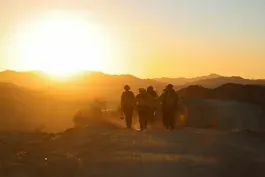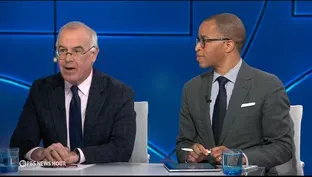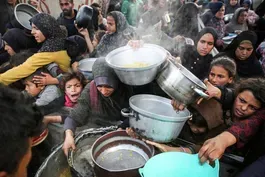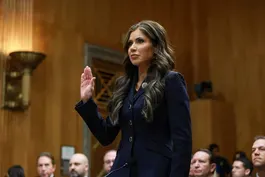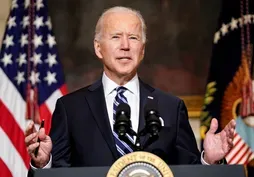
How businesses are preparing for Trump's tariffs
Clip: 1/17/2025 | 9m 22sVideo has Closed Captions
How businesses are preparing for the tariffs Trump has promised to impose
Countries and businesses around the world will be watching to see just how quickly President-elect Donald Trump imposes new tariffs and just how steep they may be. News Hour special correspondent and Washington Post columnist Catherine Rampell reports on how some companies are already preparing.
Major corporate funding for the PBS News Hour is provided by BDO, BNSF, Consumer Cellular, American Cruise Lines, and Raymond James. Funding for the PBS NewsHour Weekend is provided by...

How businesses are preparing for Trump's tariffs
Clip: 1/17/2025 | 9m 22sVideo has Closed Captions
Countries and businesses around the world will be watching to see just how quickly President-elect Donald Trump imposes new tariffs and just how steep they may be. News Hour special correspondent and Washington Post columnist Catherine Rampell reports on how some companies are already preparing.
How to Watch PBS News Hour
PBS News Hour is available to stream on pbs.org and the free PBS App, available on iPhone, Apple TV, Android TV, Android smartphones, Amazon Fire TV, Amazon Fire Tablet, Roku, Samsung Smart TV, and Vizio.
Providing Support for PBS.org
Learn Moreabout PBS online sponsorshipGEOFF BENNETT: Countries and businesses around the world will be watching to see just how quickly president-elect Donald Trump imposes new tariffs after he takes office on Monday and how steep those tariffs may be.
"PBS News Hour" special correspondent and Washington Post columnist Catherine Rampell reports on how some companies are already preparing.
RICK MUSKAT, President and COO, Deer Stags Concepts, Inc.: So this is one of our newer products that's made with our new S.U.P.R.O.
comfort technology.
CATHERINE RAMPELL: When Donald Trump won in November, Rick Muskat's first call was to China.
RICK MUSKAT: Called our major supplier, found out how many more pair they could make for us before they closed for Chinese new year.
And we bought 30,000 pair that day.
CATHERINE RAMPELL: Trump has threatened 60 percent tariffs or taxes on Chinese made goods, which might include all the shoes Muskat's company, Deer Stags, sells.
RICK MUSKAT: We import and distribute around the United States both men's and boys' shoes.
We call it affordable comfort fashion.
CATHERINE RAMPELL: He says shifting production here is not an option, given labor costs.
RICK MUSKAT: Shoes have over 200 operations and there's a lot of labor in the making of shoes.
CATHERINE RAMPELL: Plus: RICK MUSKAT: There's no factories here to move production back, so we don't have the option.
CATHERINE RAMPELL: Stacking up early was risky.
His shipment might not arrive before new tariffs start.
RICK MUSKAT: You're tying up your capital, you're paying storage, and you're making decisions on what you think the consumer is going to buy well in advance of when the consumer decides what they want to buy.
And sometimes you're wrong.
RYAN PETERSEN, CEO, Flexport: We see about a 20 percent increase in bookings relative to expected.
CATHERINE RAMPELL: Ryan Petersen is CEO of Flexport, a trade and logistics company.
RYAN PETERSEN: There's a lot of uncertainty about where the tariffs will be, where they will land.
But one thing you know is, they're probably coming.
And so the easiest thing to do is, if you can, move the goods in early and get them here before the tariffs hit.
CATHERINE RAMPELL: Firms also look for creative ways to duck future tariffs.
RYAN PETERSEN: Customs workers have all sorts of strategies to help you with tariff engineering.
You could change the components of your product that, if the components are 51 percent polyester versus 49 percent polyester, that's a different duty code.
CATHERINE RAMPELL: After Trump's earlier trade wars and COVID, many companies began moving their supply chains, but mostly not to the U.S. RYAN PETERSEN: The biggest winner for sure was Vietnam, Mexico probably right up there.
And it's continued to move for many years because of the cost of labor.
So you see a lot moving into Thailand, Malaysia, Cambodia, India, throughout Latin America.
CATHERINE RAMPELL: But these moves carry geopolitical risk.
RYAN PETERSEN: Jordan, which is a peaceful place, but is surrounded by all kinds of conflict.
And so a number of our customers who set up manufacturing in Jordan in order to take advantage of free trade agreements quickly found out, oh, wow, it's, like, not that easy.
CATHERINE RAMPELL: Their new location could get hit by tariffs too.
JENNY GOODMAN, Co-Founder and CEO, TILIT: So we have been working to onboard this factory in Mexico for about two years.
CATHERINE RAMPELL: Jenny Goodman co-founded TILIT, a hospitality workwear company, with her partner, Alex McCrery.
They thought they were smart to diversify production away from China and Colombia.
JENNY GOODMAN: So Mexico was sort of a buffer for that should there be any issues in Asia moving forward.
CATHERINE RAMPELL: Then, in November, Trump threatened huge tariffs on Mexico too.
So it feels a little bit like Whac-A-Mole.
JENNY GOODMAN: Yes, a little bit like a Whac-A-Mole.
CATHERINE RAMPELL: TILIT does produce 10 percent of its products, the more expensive seasonal fashion collection, here in New York.
Are you trying to find alternatives here domestically?
JENNY GOODMAN: Not at the current moment.
We feel that we're pretty much at max capacity with what we can produce domestically, based on price sensitivity of our customer and skilled labor.
It's like, every time that we lose a seamstress, it takes a while to find and replace somebody because there isn't a huge pool of skilled labor anymore here.
CATHERINE RAMPELL: Tariff threats have stressed their business.
JENNY GOODMAN: We have some really big orders that we have been working on for about 15 months now and we have quoted those orders sourcing out of our factory in China.
So if there's a 10 percent increase and our margin is slim because it's a huge order, that could really impact whether we have to, A, raise prices or, B, take an even worse margin hit.
CATHERINE RAMPELL: Their Mexican factory partner has agreed to absorb some of the tariff risk, but some costs would have to get passed on to customers, and they might find that hard to swallow.
JENNY GOODMAN: We're already in this period where we're trying to combat inflation, especially in our industry, because everything's gotten more expensive for restaurants.
The butter has gotten more expensive.
The uniforms have gotten more expensive.
The labor has gotten more expensive.
So the tolerance for large increases in prices would be really challenging for us.
CATHERINE RAMPELL: Research on Trump's earlier tariffs found they were mostly paid by American businesses and their customers.
MARY LOVELY, Peterson Institute for International Economics: What we saw using tens of thousands of customs records is that the price that we paid the exporters didn't change.
And so we believe that those tariffs were passed through 100 percent to U.S. importers.
CATHERINE RAMPELL: Mary Lovely studies trade at the Peterson Institute for International Economics.
MARY LOVELY: Washing machines, we saw an almost immediate increase in price.
Many of them are made in South Korea.
The South Korean-made washing machine was more than $1,000 dollars.
But then also the domestic-made machine was also higher, as was the dryer, even though there were no tariffs on dryers.
CATHERINE RAMPELL: Trump's plan for a 20 percent across-the-board tariff, plus a 60 percent tariff on China, suggests price increases for consumers could be large.
MARY LOVELY: The burden on the average family would be a minimum of $2,700 a year.
Estimates that include those increases in domestic prices as well go up to $4,000 and above for the average American household.
CATHERINE RAMPELL: This will all ricochet back to U.S. companies.
MARY LOVELY: Some people are going to be pushed out of the market.
They just won't buy it all.
Other people will buy fewer of whatever item it is.
Either way, the company is going to be selling fewer items, have slower growth, and many of them will actually have fewer workers.
CATHERINE RAMPELL: There will be some domestic winners.
MITCH CAHN, President, Unionwear: Anything that makes it more expensive or difficult for somebody to import products that we make domestically helps us.
Chaos in general helps domestic manufacturers.
I hate to put it that way, but... CATHERINE RAMPELL: Mitch Cahn founded Unionwear, which produces hats and bags in New York and Jersey, three decades ago.
MITCH CAHN: In 1992, there were well over 1,000 hat manufacturers and over 1,000 bag manufacturers when we started.
But there are probably four or five hat factories left and maybe about 15 or 20 bag factories.
CATHERINE RAMPELL: He's seen a lot in that time.
MITCH CAHN: We used to rent this space and the production floor over the right over there to a biker gang.
CATHERINE RAMPELL: Turns out New Jersey has geopolitical risks too.
MITCH CAHN: The biker gang came to us and said, this neighborhood is not very safe, and we will put an end to all of that if you just give us this space for our club.
And we do have one remnant from them being here, which is this stripper pole in the middle of our cafeteria.
CATHERINE RAMPELL: So what happened to the gang?
MITCH CAHN: They got in trouble with the local authorities and had to leave Newark.
CATHERINE RAMPELL: Most American consumers don't care about that Jersey authenticity.
MITCH CAHN: There's a lot of people who are very pro-made in USA that are not buying made-in-USA goods, and they don't really think twice about it.
Consumers are generally driven to buying the least expensive thing.
CATHERINE RAMPELL: Unionwear's biggest clients are unions, the military, and organizations that care about co-branding with a made-in-USA label, like political campaigns.
MITCH CAHN: So this is one of the most popular hats that we ever made.
We ended up making about 5,000 units a day of this baseball hat.
CATHERINE RAMPELL: Cahn predicts a boom in USA-made products in the next few years unrelated to tariffs.
MITCH CAHN: That's just being driven by this very strange, almost perfect storm of events that are coming our way.
One of them is the USA's 250th birthday.
One of them is U.S. hosting the World Cup.
One of them is U.S. hosting the Olympics, which definitely drive demand for us.
CATHERINE RAMPELL: Cahn thinks tariffs will give Unionwear an added boost, even though his machinery comes from abroad.
MITCH CAHN: We pulled forward a purchase of equipment from Canada to beat the clock on tariffs, and then we paused any additional purchases until the tariff situation works itself out.
CATHERINE RAMPELL: Even with tariffs, ramping up production won't be easy.
MITCH CAHN: We have difficulty recruiting workers, and we're in New Jersey, New York, with a large immigrant population, a lot of people with experience selling.
We find it harder and harder to hire people who want to work in a factory.
That's part of the issue.
CATHERINE RAMPELL: Cahn is investing in what may be the key to making us manufacturing more competitive, robots.
MITCH CAHN: We are automating our bag production.
That will reduce our labor costs down to, like, maybe 15 percent of the cost of the bag, and that's going to have a tremendous difference.
CATHERINE RAMPELL: How much will the tariffs actually cost companies, consumers, workers?
We will soon find out.
For the "PBS News Hour," I'm Catherine Rampell in Newark, New Jersey.
Amanda Gorman pens tribute to crews battling LA wildfires
Video has Closed Captions
Poet Amanda Gorman pens tribute to crews battling the Los Angeles wildfires (4m 30s)
Brooks and Capehart on Biden's legacy, Trump's expectations
Video has Closed Captions
Brooks and Capehart on Biden's legacy and what to expect from Trump's 2nd term (10m 3s)
Gazans desperate for aid but hopeful worst is behind them
Video has Closed Captions
Gazans desperate for aid but hopeful ceasefire means the worst is behind them (7m 10s)
McGurk breaks down complex negotiations to reach ceasefire
Video has Closed Captions
Brett McGurk breaks down complex negotiations to reach Israel-Hamas ceasefire (6m 56s)
News Wrap: Noem questioned about Trump's immigration policy
Video has Closed Captions
News Wrap: Noem faces questions about Trump's immigration policies (7m 54s)
Supreme Court clears way to ban TikTok in the U.S.
Video has Closed Captions
Biden White House says enforcement of TikTok ban will fall to Trump (5m 52s)
Providing Support for PBS.org
Learn Moreabout PBS online sponsorshipMajor corporate funding for the PBS News Hour is provided by BDO, BNSF, Consumer Cellular, American Cruise Lines, and Raymond James. Funding for the PBS NewsHour Weekend is provided by...

